How Woodrow Wilson Crushed The Anti-War Left
Historian Adam Hochschild joins the program to discuss how Woodrow Wilson suppressed the left in America during World War I. Wilson signed the Sedition Act of 1918 and the Espionage Act of 1917 into law as a way to suppress dissent and punish those who spoke out against the government or the war effort during World War I. The Sedition Act made it illegal to use "disloyal, profane, scurrilous, or abusive language" about the government, the flag, or the military. At the same time, the Espionage Act criminalized the disclosure of information about national defense. Wilson used these laws to aggressively target left-wing groups and individuals, including socialist, anarchist, and labor organizations, as well as journalists and pacifists. Many people were arrested, imprisoned, and fined under these laws, and the First Amendment's guarantee of free speech was significantly curtailed.
Watch the Majority Report live Monday–Friday at 12 p.m. EST on YouTube OR listen via daily podcast at http://www.Majority.FM
https://www.house.gov/representatives/find-your-representative
https://www.senate.gov/senators/senators-contact.htm
#SamSeder #EmmaVigeland #MajorityReport #politics #news #progressive #leftist #democrats #liberal
SUPPORT the show by becoming a member: http://www.jointhemajorityreport.com/
Download TMR's FREE app: http://www.majorityapp.com
TMR MERCH: http://www.shop.majorityreportradio.com
CHECK OUT MORE from the MR crew:
Matt Binder DOOMED https://www.youtube.com/MattBinder
Brandon Sutton DISCOURSE https://www.patreon.com/ExpandTheDiscourse
Emma Vigeland ESVN https://www.youtube.com/ESVNShow
Matt Lech LEFT RECKONING https://www.youtube.com/LeftReckoning
OTHER LINKS:
Twitch: https://www.twitch.tv/themajorityreport
Facebook: http://facebook.com/MajorityReport
Twitter: http://twitter.com/MajorityFM
Instagram: https://www.instagram.com/majorityreport.fm/
Check out more from the MR crew:
Matt Binder DOOMED https://www.youtube.com/MattBinder
Brandon Sutton THE DISCOURSE https://www.patreon.com/ExpandTheDiscourse
Emma Vigeland ESVN https://www.youtube.com/ESVNShow
Matt Lech LEFT RECKONING https://www.youtube.com/LeftReckoning
Image Credit, Now for a round-up / W.A. Rogers.
https://picryl.com/media/now-for-a-round-up-wa-rogers?zoom=true
https://creativecommons.org/publicdomain/
Image has been cropped and color has been altered.
Image Credit, GPA Photo Archive
https://www.flickr.com/photos/iip-photo-archive/24861706982
https://creativecommons.org/publicdomain/
Image has been cropped and color has been altered.
And this is when we had the Advent of the Espionage Act and the Sedition Act which I've made a comeback over the past couple of you know a decade or two. But the wait gives me your sense of just having you know with that metaphor out there of pouring the gasoline on these different fires what was the impetus for Wilson to get into the war and how much was what was happening domestically how much of what was happening domestically was sort of like what's the relationship between that. I mean you know because he should remind people too this is also the time we had no income tax until around I guess 1917. And how much talk about the Dynamics there because you know why he wanted to enter this War you made the point in the book that I think our army at that time was our military was the size of maybe it was Portugal's. and so we weren't a military power but there was some semblance of like this is our way this is our ticket to become one. I think that I think you've hit something there with the idea of the ticket. Wilson was a very ambitious man. a paradoxical man. and I think he from the beginning felt that the United States in some way or other had to make use of this enormous crisis. This was the largest War the world had ever seen which began in 1914. You know it would, unfortunately, be surpassed several decades later. But at that point history had never seen something so murderous. and he felt like the United States had a sacred Mission. At first, he thought to stop the war and somehow impose peace. Then he came to feel when he saw that the war was completely deadlocked in late 1916 or early 1917 that it was time for the United States to enter the war because we couldn't put our stamp on the world unless we had helped end this war. From the beginning, it really was a myth that the U.S. was neutral. because we were selling huge amounts of arms and Munitions Industrial Supplies to the Allies. principally Britain and France but also Russia and Italy who were on the Allied side. Huge amounts. You know bullets, machine guns, parts that would be assembled into submarines and destroyers, artillery pieces, all kinds of stuff. 40 percent of the British military budget was being spent in the United States. so the U.S was not really neutral theoretically American Business was equally free to sell to Germany in Austro-hungry.
-
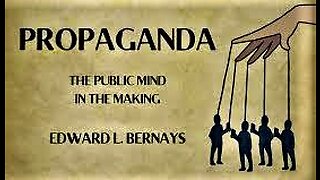 12:24
12:24
BrookeCerda
1 year agoEdward Bernays and Woodrow Wilson’s WWI
2.27K1 -
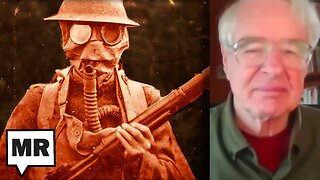 39:12
39:12
majorityreport
1 year agoHow World War One Devastated The American Left | Adam Hochschild | TMR
571 -
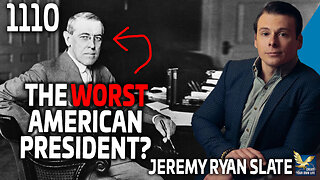 15:25
15:25
The Jeremy Ryan Slate Show
11 months ago $0.05 earnedWoodrow Wilson: Was He Really the Worst American President?
2012 -
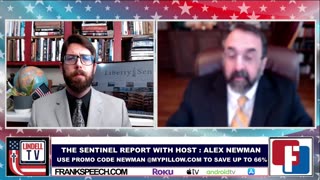 29:59
29:59
Liberty Sentinel
1 year agoIt's a TRAP: The Left WANTS Civil War to Crush America
3K3 -
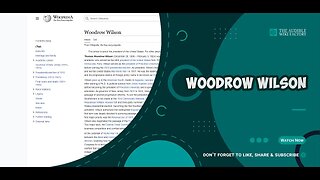 1:18:44
1:18:44
The Audible Wiki Factory
1 year agoThomas Woodrow Wilson was an American politician and academic who served as the 28th president
201 -
 59:25
59:25
Deus Meum Que Jus
1 year agoWilliam Cooper - HOTT - Constitution Party vs War 8.29.94
246 -
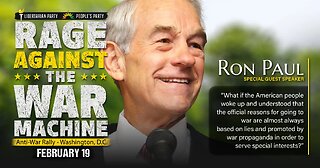 3:31:53
3:31:53
MOX NEWS
1 year agoRage Against The War Machine! Anti-War Rally In Washington DC
7843 -
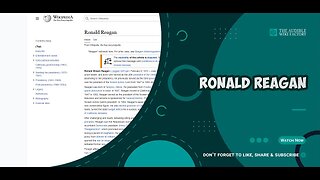 1:02:00
1:02:00
The Audible Wiki Factory
1 year agoRonald Wilson Reagan was an American politician, union leader, and actor who served as the 40th
307 -
 5:42
5:42
PragerU
3 months agoWoodrow Wilson: World War I and the League of Nations | 5 Minute Video
7.38K3 -
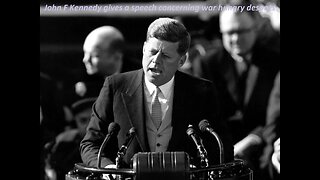 3:10
3:10
You can do everything you think is right and still fail, this is not weakness... it is simply life.
1 year agoJohn Fitzgerald Kennedy, 35th President of the United States of America gives a Speech against War.
13